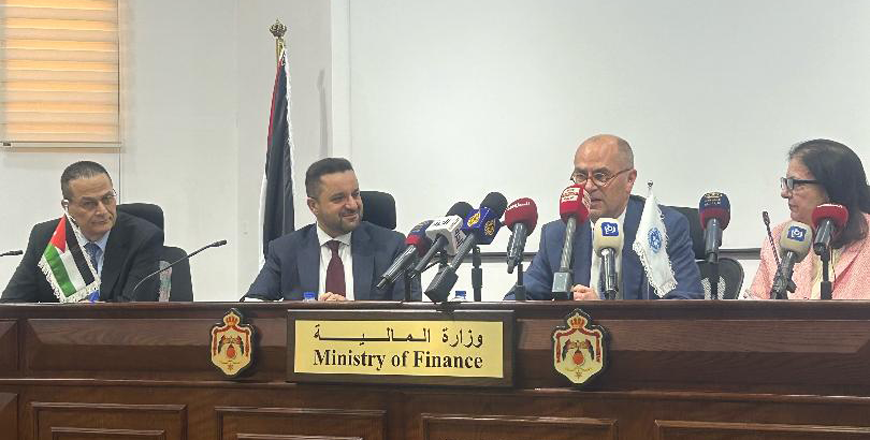You are here
Al-Ississ: Jordan 'vigorously' implementing fiscal reform programmes — Finance minister
By JT - Nov 16,2022 - Last updated at Nov 16,2022
AMMAN — The financial reform programme, supported by the International Monetary Fund’s (IMF) Extended Fund Facility (EFF) arrangement, seeks to strengthen social security and maintain financial and monetary stability, Finance Minister Mohamad Al-Ississ said.
An International Monetary Fund (IMF) mission led by S. Ali Abbas reached a staff-level agreement on the fifth review of the authorities’ financial reform programme, which is supported by the Extended Fund Facility (EFF) arrangement.
Al-Ississ in a joint press statement with the IMF delegation, described the programme as “a national programme par excellence based on national goals set by the government to raise the Jordanian economy’s competitiveness to provide jobs, raise the level of transparency and improve financial accountability”, the Jordan News Agency, Petra, reported.
Many countries have lost part of their stability in light of the difficult economic conditions facing the world, including a state of recession and inflation following the spread of the coronavirus pandemic and the Russia-Ukraine crisis.
Al-Ississ highlighted the importance of this review as it reaffirms the fact that Jordan is still “vigorously” implementing fiscal reform programmes to its global financial institutions.
The Jordanian government is committed to not increasing already-existing taxes or fees, or imposing new fees and taxes, he said, indicating that the government believes that the public currently bears the burden of difficult living conditions.
Describing Jordan as economically, financially and monetarily stable, he noted that the Central Bank of Jordan (CBJ) has succeeded in maintaining monetary stability in light of unprecedented global economic conditions.
CBJ Governor Adel Sharkas said that the programme aims to maintain macro, financial and monetary stability.
Additionally, the programme intends to bolster Jordan’s national economy to face external challenges, thus achieving higher growth rates, reforming the labour market, raising economic participation and enhancing the business environment, he added.
Sharkas stressed that Jordan's success lies in concluding the review in a timely manner for the fifth time, which confirms the soundness of Jordan’s economic approach and the stability of its macroeconomic, financial and monetary environment.
Jordan is taking steady strides towards economic reform, which leads to an increase in economic growth rates, and reflects positively on people’s living standards and well-being, he added.
The IMF delegation commended CBJ’s monetary policy, its success in maintaining financial and monetary stability in the Kingdom, and its rapid and effective response to regional and international financial developments, he said.
Sharkas added that the IMF confirmed that CBJ’s policy succeeded in balancing monetary stability while simultaneously supporting vital sectors as part of CBJ’s financing programme of vital sectors, which stands at a value of JD1.3 billion, as well as its programme to support medium-sized companies.
In turn, the IMF delegation stressed the importance of CBJ’s commitment to maintaining the Jordanian dinar to US dollar exchange rate, which serves the Kingdom’s national economy.
The delegation referred to Jordan’s $16 billion of foreign exchange reserves, describing it as a “comfortable” amount.
Lauding the strength and resilience of Jordan’s banking system, its ability to withstand turbulent situations and its optimal risk management, the delegation explained that Jordan's economy is "on the right path.”
“Despite turbulent global economic conditions, sound fiscal and monetary policies have helped maintain macroeconomic stability and access to international markets. The government is expected to narrow its primary deficit (excluding grants) by 0.7 per cent of GDP to 3.7 per cent of GDP in 2022, with larger-than-expected fuel and food subsidy costs being offset by a rationalisation of non-priority spending and a significant revenue over performance,” Abbas said.
Related Articles
AMMAN — Sovereign credit rating agency Standard & Poor’s (S&P) has maintained Jordan’s credit outlook as B+/B with a stable outlook,
AMMAN — Despite the global economic crisis, the Jordanian economy has managed to overcome it, showcasing its resilience and strength, and th
AMMAN — The government and the Central Bank of Jordan, together with the International Monetary Fund (IMF) reached a staff-level agree



















